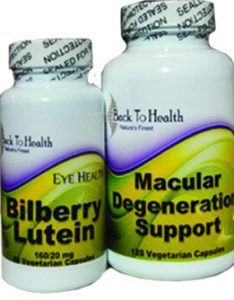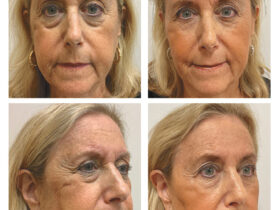 Bilberry/Lutein
Bilberry/Lutein
Bilberry Extract: Bilberry has been used for centuries, both medicinally and as a food in jams and pies. It is related to the blueberry and is native to northern Europe. Bilberry fruit contains chemicals known as anthocyanosides, plant pigments that have excellent antioxidant properties. They scavenge damaging particles in the body known as free radicals, helping prevent or reverse damage to cells. Antioxidants have been shown to help prevent a number of long-term illnesses, such as heart disease, cancer, and an eye disorder called macular degeneration. Bilberry also contains vitamin C, which is another antioxidant. (0)
Back to Health uses bilberry extract with 25% anthocyanidin content, which yields 40 mg of active constituents.
Lutein Extract: Gluten is a naturally occurring carotenoid found in high quantities of green leafy vegetables such as spinach and Kale. When consumed, lutein. Tends to accumulate in the macula of the eye where it is thought to protect the retina finally ionizing a fact of blue light, which comes from many light sources.
A study showed that increased pigmentation from Lutein consumption decreases the risk for eye diseases like AMG (age related macular degeneration). (1)
There is also evidence that Lutein consumption lowers the risk of cataract development. (2)
Back to Health, the manufacturer, uses Biolut lutein, which is a proprietary patent pending process that results in a free-flowing powder containing 90% of lutein esters. These 90% lutein esters are equivalent to 45% free lutein, the most purified form of lutein market today. (3)
As with ALL dietary supplements from the Back to Health line by Independent Nutrition Centers, Bilberry/Lutein is HIGH in quality and has NO excipients. It also encapsulated in a high quality vegetarian capsule and any fillers that are added are always local race fillers which usually doesn’t have the negative reactions that some fillers like gluten can have.
These statements have not been evaluated by the FDA. This product is not intended to diagnose, treat, cure or prevent any disease.
Macular degeneration support “Back to Health” brand (Independent Nutrition Centers Eugene OR)
Noni juice: Noni juice mimics the secretion coming from the pineal gland, and in fact, acts as a precursor to it, building it up and allowing it to function fully. Noni juice has a black color, very similar to the melanin that gives color or pigment to each one of our organs. Every place our body contains this pigment will be affected by Noni juice. The back of the eye has a black area caught the macula which is pigmented with melanin. That is the area the light hits when your eye opens. Noni is rich in vitamins A, E, C, B complex, carotenoids (Lutein and Zeaxanthin), trace minerals such as calcium, magnesium, potassium, zinc, molybdenum, etc., all flavonoids, and over 150 phytonutrients. All of those ingredients present anyone fruit has made the Noni a powerful super antioxidant.
L-Taurine: Taurine Is believed to enhance the rods and cones—the pigmented epithelial cells in the retina of the eye that serve as visual receptor cells. The greatest visual acuity occurs in the macula area of the retina near where the optic nerve enters in the back of the eye. As we age, the macula commonly degenerates, as rods and cones die, which can result in blindness. The cause of the degeneration it’s unclear, but it occurs more commonly in diabetics and maybe the result of free radical damage from ultraviolet light for oxygen exposure.
Zinc: Zinc is recommended for individuals diagnosed as being at high risk for age-related macular degeneration (AMD), or are already experiencing the early stages of AMD. The human body does not synthesize this think it needs, which is the reason why read meat,
seafood, poultry, eggs, wheat germ, mixed nuts, black-eyed peas, tofu and baked beans are essential to good nutrition. Daily intake of zinc through diet, nutritional supplements, or fortified foods and beverages is important for the maintenance of good eye health.
Zinc and age-related macular degeneration
The age-related eye disease study (AREDS) was a landmark study that established AMD as a nutrition responsive disorder. The study showed that a 40 to 80 mg per day intake of zinc, taken with antioxidants beta-carotene, vitamin E and vitamin C, slows the progression of advanced age related macular degeneration by about 25% and visual acuity loss by 19% an individual at high risk for the disease.
These statements have not been evaluated by the FDA. This product is not intended to diagnose, treat, cure or prevent any disease.
OUR NEW LOCATION:
Naples – 239-353-7778
13040 Livingston Road
Naples FL 34105
fgsorganicmarkets.com
References
(0) https://umm.edu/health/medical/altmed/herb/bilberry
(1) https://archopht.lamanetwork.com/article.aspx?article=419811
(2) http://informahealthcare.com/doi/abs/10.1185/03007995.2010.494549
(3) http://www.bluecal-ingredients.com/productsandservices/botanical.extracts.php
http://www.consumerhealth.org/article/display.cfm?IDM=19990303205600http://www.smart-publications.com/articles/taurine-protects-heart-eyes-and-improves-glucose-tolerancehttp://www.aoa.org/x11848.xml









